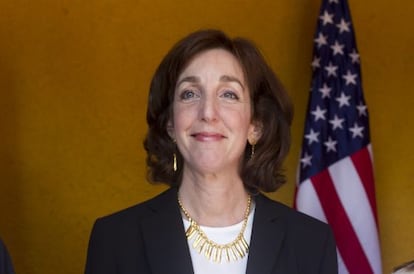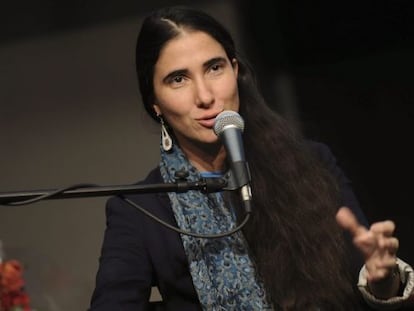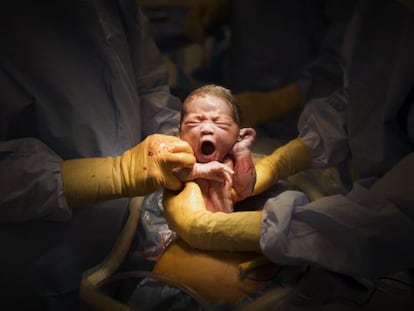“Cuba is changing”
The US assistant secretary of state for Western Hemisphere Affairs Roberta S. Jacobson discusses the effect the death of Hugo Chávez will have on Latin America


Roberta S. Jacobson could well be the first high-ranking official in a US administration who is seeing positive changes in Cuba. Not political changes, not the kind of change that is required to lift the embargo, but changes that point to the opening up of the economy and a modernization of the country. In an interview inside her office at the US Department of State, the assistant secretary of state for Western Hemisphere Affairs also praised the work of Mexican President Enrique Peña Nieto during his first months in office, and called for the celebration of free, democratic elections in Venezuela.
Question. What changes does the US expect in its relations with Venezuela following the death of Hugo Chávez?
Answer. We want to establish a positive, productive working relationship with any government that emerges from the April 14 elections. We believe there are areas such as drug trafficking and trade relations, including energy, where we can work together to restore confidence and take the relationship forward. If there are other issues on which we can come to an understanding, we are willing to include them, too.
Q. What is the US expecting from those elections?
A. We believe that Venezuelans deserve open, fair and transparent elections, where everyone can exercise their right to vote with the knowledge that their decision will be respected. We would like to see international observers there – the Organization of American States or the European Union for instance – but we don’t know whether the Venezuelan government will agree to invite them. It did not do so in the last elections. But even more important are the local observers, whom I hope will be accredited and have permission to do their job.
Q. Have these elections been called too quickly?
Capriles will be a good president, but we don’t have a favorite in those elections”
A. Yes, it was very fast. But the main thing now is for the elections to be clean and transparent. It will be a little difficult, but this is what Venezuelans and the international community must support.
Q. What you are asking for, at the end of the day, are truly democratic elections.
A. Yes, I am describing democratic elections. This includes a free press, which we have not seen so much in recent years in Venezuela. This is important so that everyone, the government and the opposition, can send their message to the voters. We are asking for democratic elections in which all Venezuelans can decide their future.
Q. Do you think that opposition leader Henrique Capriles can win?
A. Anyone has a chance of winning an election. I think it will be difficult with such little time left, but anyone can win. It is up to Venezuelans to decide. Anyone who is elected by the Venezuelan people could be a good choice. Capriles could be a very good president, but we don’t have a favorite. The main thing for us is for the process to be clean and democratic.
Q. Without Chávez, will the US find greater possibilities of defending its interests in Latin America?
We have seen a very strong, positive start by Peña Nieto”
A. I think that Latin America, with or without Chávez, is a region with which we have very good and very fruitful relations. To the US, it is a region of opportunity. In the past this region was often talked about in terms of threats, but now we also need to talk about opportunities. We are talking about the Pacific Alliance on trade and economic development. We are talking about space and education cooperation with Argentina. We are even talking about relations with Venezuela.
Q. Do you feel that Chávez’s influence on Latin America will be long-lasting or short-lived?
A. We need to wait before we can know that. We need some distance.
Q. How will Chávez’s death affect the situation in Cuba?
A. That, too, will depend on the Cubans. Cuba and Venezuela have had very close relations. I don’t know whether that is going to change, perhaps not quickly, but we have also seen economic changes in Cuba with the future in mind. Cuba has suffered economically for years. The system did not work, and now they are slowly opening up the system to reflect the global world, the modern world. This is also due to the fact that they have no oil and that the latest efforts to find oil in Cuba have failed.
Q. Do you admit, then, that Cuba is changing?
We support the Colombian government’s negotiations with the FARC”
A. We have seen changes – not very big ones, not systematic ones, but we have definitely seen small changes in the economic system: the possibility of opening a business, of selling your house or your car. These are changes that could be important, but we have not yet seen political changes.
Q. If Cuba is changing, why is the US not lifting the embargo?
A. That does not fall to the president. The president has changed several laws to enable travel and to increase contact between people. We want to encourage contact with humanitarian groups, cultural groups, churches... We want to encourage Cuban civil society.
Q. Lifting the embargo would speed all that up.
A. We have seen changes on the economic front, but we have not seen political changes, and the embargo law says that political changes are necessary in order for it to be lifted. There are no political parties and no free press. We need to see something big and something different to change that law, and it is up to Congress to do that.
Q. What is the United States’ opinion on the first 110 days of Enrique Peña Nieto’s government in Mexico?
Latin America is present in US corridors of power”
A. We have seen a very strong, positive start. We have seen a lot of reforms that many people inside and outside Mexico had been demanding for years: labor reform and education reform, which are very important for Mexico. They are dealing with energy reform, competitiveness and telecommunications reform. To us, this is positive. We want to focus our relations with Mexico on economic issues, besides security, because focusing on economic issues with Mexico means increased competitiveness in the region, and also in North America. I think we have gotten off to a very good start with the Mexican government.
Q. It would seem that drug trafficking, violence and human rights in Mexico are taking a back seat.
A. Maybe it’s a change in tone and emphasis. Of course we have had talks on security and violence. We are still cooperating. Unfortunately, the violence has not ended. There is still much to be done, and we are cooperating. But the priorities are set by the Mexican government.
Q. Do you think that Mexico can consolidate as a great economic power, at the same level as China, India or Brazil?
A. I think so. It’s very likely. As Peña Nieto says, this is Mexico’s moment. I don’t know whether it is on the same level as India or China, but the outlook is a lot more optimistic than it was a few years ago.
Q. And what can the US do to help that happen?
A. There are currently two domestic debates in the US that can greatly aid our foreign policy: one is migratory reform, which could be approved this year [she crosses her fingers] and another one is arms control.
Q. Among the things you like about Peña Nieto, do you include the arrest of Elba Esther Gordillo [the powerful leader of the teachers’ union, who was recently detained for embezzlement]?
A. I don’t want to voice an opinion on that matter. It is a Mexican issue. What I do want to say is that education reform is very important. The economic growth that took place in Mexico and Latin America – over 50 million people have joined the middle class – is not sustainable without education.
Q. Does the US support the Colombian government’s negotiations with the FARC?
A. Yes, without a doubt. We support the efforts of President Santos. Colombians deserve peace and security, and this is a positive moment to attempt it. We are continually cooperating with Colombia, although we are not formally part of the process.
Q. Do you understand the complaints of people who feel that this negotiation is a betrayal of the victims?
A. Of course I understand that. I understand the complaints by a few sectors, but in the end it is the Colombian government’s decision, and we support it. We believe that the victims will not gain from the current violence, either.
Q. Are you not suspicious about the fact that the talks are taking place in Havana?
A. No. All the information I have seen says that the Cubans support the negotiations. I think they have played an important role.
Q. Do you feel that the referendum in the Falkland Islands was appropriate?
A. I cannot voice an opinion on the referendum or whether it was appropriate or not. On this matter, we have always walked a very fine line in order not to offend any of the countries involved. We would prefer that they be the ones to resolve this problem.
Q. Finally, despite all your praise in this interview for the situation in Latin America, the fact is that this region is not a preferential focus for US foreign policy. Why is that?
A. Foreign policy has to deal with the crises first, and there are no serious problems in Latin America or the Caribbean – there are no wars, as there is in Syria, there is no starvation, as there is in Africa, there are no terrorist threats… But Latin America receives 40 percent of US exports and creates a lot of jobs in this country. It is not the kind of relationship that generates media headlines, but it is very much present in society.
Q. Can we say, then, that Latin America is not in the White House’s war room, but it is in US society?
A. In society and in the corridors of power as well.
Tu suscripción se está usando en otro dispositivo
¿Quieres añadir otro usuario a tu suscripción?
Si continúas leyendo en este dispositivo, no se podrá leer en el otro.
FlechaTu suscripción se está usando en otro dispositivo y solo puedes acceder a EL PAÍS desde un dispositivo a la vez.
Si quieres compartir tu cuenta, cambia tu suscripción a la modalidad Premium, así podrás añadir otro usuario. Cada uno accederá con su propia cuenta de email, lo que os permitirá personalizar vuestra experiencia en EL PAÍS.
¿Tienes una suscripción de empresa? Accede aquí para contratar más cuentas.
En el caso de no saber quién está usando tu cuenta, te recomendamos cambiar tu contraseña aquí.
Si decides continuar compartiendo tu cuenta, este mensaje se mostrará en tu dispositivo y en el de la otra persona que está usando tu cuenta de forma indefinida, afectando a tu experiencia de lectura. Puedes consultar aquí los términos y condiciones de la suscripción digital.

